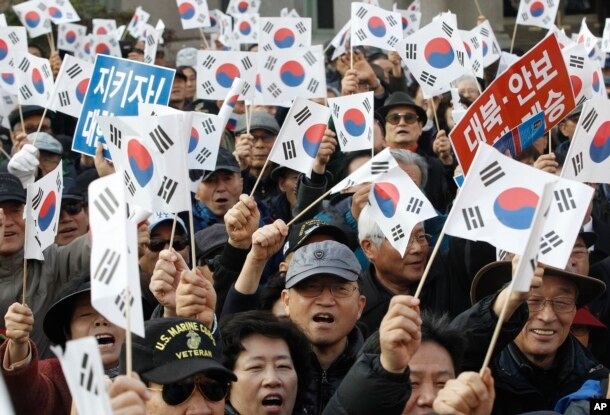South Korea Begins March Towards Impeachment of President
South Korea Begins March Towards Impeachment of President
South Korean protesters march toward the presidential house during a rally calling for South Korean President Park Geun-hye to step down in Seoul, South Korea, over the weekend.
South Korean opposition parties Monday began planning for the possible impeachment of President Park Geun-hye, after prosecutors, over the weekend, labeled her a co-conspirator in an influence peddling scandal involving a longtime friend and some of Park's closest aides.
“[Our party] will immediately review the timing and procedure of impeachment and will establish an organization to proceed and review the process,” said Choo Mi-ae, the leader of the main opposition Democratic Party in the National Assembly, on Monday.
Choi charged
Over the weekend federal prosecutors indicted the president’s close friend Choi Soon-sil with abuse of authority, coercion and attempted fraud for allegedly forcing major Korean corporations to donate more than $65 million to two sports foundations using threats of tax audits, and for contriving side deals connected to these nonprofit organizations that benefited her privately owned companies.
Ahn Jong-bum, one of Park’s former aides who resigned in September when news of the scandal broke, was also indicted for allegedly collaborating with and assisting Choi.
Another adviser, Jeong Ho-seong, was charged with leaking government secrets to Choi, who was allegedly influential in formulating government policy and reviewed some of President Park’s speeches even though she held no official position or security clearance.
The prosecution claims that evidence collected, including notebooks and recorded phone conversations with aides, implicated President Park as an accomplice to the alleged crimes committed by those around her.
“Based on the evidence we have secured so far, we have concluded that Park is complicit with many illegal acts committed by Choi, Ahn and Jeong,” said Lee Young-ryeol, the head of the prosecution’s special investigation team at a news conference in Seoul Sunday.
Bias arguments
This is the first time a sitting South Korean president has been named as a criminal suspect.
The South Korean constitution prohibits the president from being charged with a crime while in office, but prosecutors can put her case on hold and charge her after she leaves office.
Speaking through her presidential spokesman Jung Youn-kuk, Park rejected the prosecution’s claims as “imagination and speculation.” She has denied any involvement or knowledge of any wrongdoings that may have been committed by those around her.
The president is now refusing to cooperate with her own Ministry of Justice investigation, after saying earlier she would allow the prosecutors to question her.

FILE - Protesters supporting South Korean President Park Geun-hye wave national flags during a rally opposing her resignation in Seoul, South Korea, Nov. 17, 2016.
Opposition leaders had voiced concerns that the Ministry of Justice working under the executive branch would be too deferential to the president. Last week the National Assembly approved an independent special counsel to conduct a separate probe that will begin next month.
Sunday, the presidential spokesman said the president will prepare for the “impartial independent counsel” and fight the charges in an impeachment trial if it comes to that.
“If the unfair political process continues based on bias arguments by the investigation team, state affairs will be thrown further into confusion. We hope we can end the controversy by going through the constitutional process,” said Jung.
Critics charge that Park is using denials and delay tactics, and now impeachment to try to run out the clock on her five-year term of office that ends in February 2018.
Constitutional court
An impeachment motion requires at least half of the parliament to start the process and a two-thirds majority to remove the president from office.
The Democratic Party leader says the president is calculating that the conservative-leaning Constitutional Court that would conduct the impeachment trial would be more “home ground” where she would get a sympathetic hearing.
“But there is no home ground for a president who has been thrown away by the people. The voters, regions, and generations, which supported President Park last election, are shouting 'get out'. The Constitutional Court may not be able to refuse hearts of the people,” said Choo.
Hundreds of thousands of people participated in peaceful protests on the streets of Seoul Saturday for the fourth straight weekend. These have been the largest demonstrations South Korea has seen since the 1980s.
The president’s approval ratings remain in the single digits.
To gain the required two-thirds majority of votes needed to impeach the president, the united opposition parties will need at least 29 members of Park’s Saenuri Party to vote against her.
There is also some risk for the opposition in pursuing impeachment. In 2004, an impeachment bid against then-president Roh Moo-hyun was overturned by the Constitutional Court, and public opinion turned against an opposition seen as abusing its power to try to take down the president.











No comments:
Post a Comment